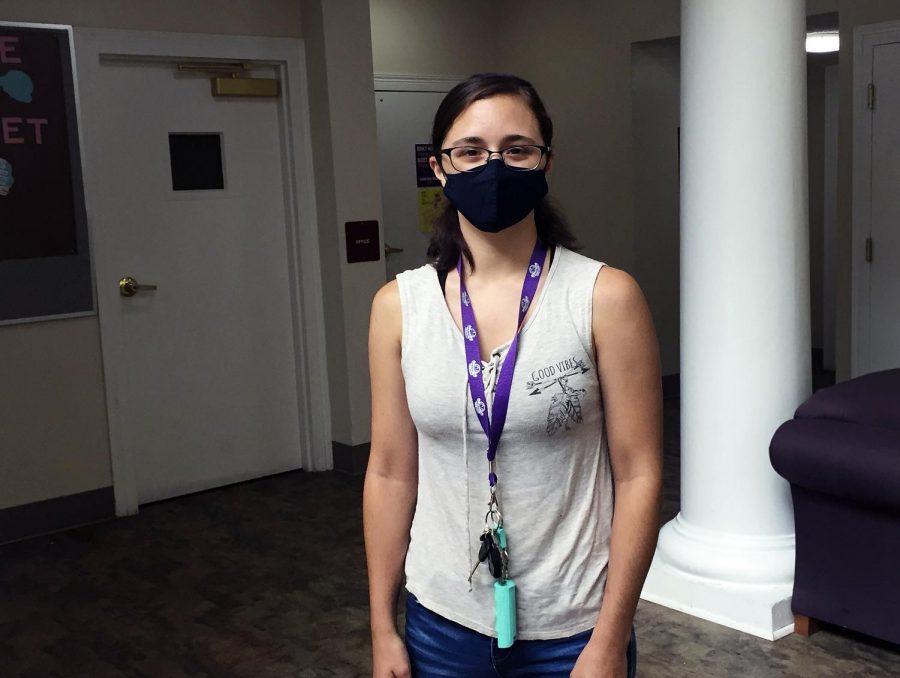Housing and Residence Life imposes new policy for fall
Casey Kula | Staff Photographer
UNA sophmore Summer Coffey moved for the fall semester into Hawthorne Hall during Move-in Week.
August 20, 2020
Ever since the University of North Alabama announced their plans to reopen in May, the University and Housing and Residence Life (HRL) have been implementing a number of efforts to minimize the risk of COVID-19 on campus.
“For example, move-in weekend has been extended from three days to seven, and residents are moving in at staggered times to prevent crowding,” said Jennifer Sutton, director of Housing and Residence Life. “All members of the University community are wearing cloth face masks, performing daily symptom checkers, and practicing social distancing and other hand-hygiene measures.”
On top of these new additions, HRL has taken a few extra steps in ensuring the safety of their students by updating their residential policy for incoming students. This update policy now includes: no roommate changes and no visitation.
“We have three types of residence halls on campus: traditional, suite, and hotel-style,” Sutton said. “Each hall has a limited number of single rooms available. Most of our residents do have roommates, and that relationship will be especially important this semester as roommates will be considered a ‘family unit’ while residing in close quarters.”
The policy is calling for no roommate changes to alleviate the spread of COVID-19 and to avoid cross-contamination. This is also the reason why visitors are not allowed for at least the first eight weeks of the semester. While roommates can only be changed if there is an emergency, visitation may be altered throughout the semester.
“We will assess [the decision to have visitations] throughout the semester and provide ongoing, timely updates,” Sutton said.
Housing and Residence Life defines visitors as individuals who are not assigned a room within the building. Residents who are assigned to the building will be permitted to visit other residents who are in the same assigned building; however, overnight guests are prohibited.
“We expect residents to adhere to no more than one guest per resident of an apartment or residence hall room at any given time,” Sutton said. “The [Resident Advisors] will work with roommate and apartment-mates to establish room/apartment agreements about how this will be managed.”
Sutton said the Resident Advisors (RA) undergo an extensive training period every fall, but HRL is incorporating strategies for working within a pandemic into almost every area of training.
“The RA’s will play a substantial role in helping students navigate relationships with their roommates and understanding the importance of shared responsibility through conflict management, roommate contracts and policy compliance,” Sutton said. “RA’s play a very critical role in building community in the residential setting so they are learning a variety of new skills to apply to that area as well. Our professional staff has worked very hard to develop creative and innovative ways of supporting students within this new way of life.”
Although it is an RA’s role to aid students, HRL is expecting their residents to responsibly commit to maintaining a safe and healthy residential community while experiencing a quality on-campus experience that supports their academic success.
Sutton said that any student caught not wearing a mask, social distancing or abiding by the updated residential policy will result in disciplinary actions.
“Students in violation of any university or residential policy are processed through the Student Conduct office,” Sutton said. “This process is meant to be educational and designed to uphold the strong values of the University.”
The Office of Student Conduct strengthens personal responsibility and accountability through investigation and resolution of alleged violations of the Code of Student Conduct, according to the university’s website. They are committed to providing a fair and educational process that fosters the highest standards of behavior, student learning, and civic responsibility while promoting a safe environment that respects the rights of all students. In addition to this, they strive to adjudicate cases of alleged misconduct in a fair, responsible and timely manner emphasizing respect, trust and integrity.
“If the Office of Student Conduct receives a report of student’s not wearing a mask on campus, violating any social gathering requirements, violating quarantine orders from Health Services, etc., they will be brought through the Student Conduct process like any other policy violation,” said Director of Student Conduct Caroline Bowen said. “The goal of the Student Conduct process is to educate our students and help them to not violate policy again.”
Bowen said that if a student is found in violation, then the outcomes could range anywhere from a formal warning, an educational opportunity to understand the seriousness of the current Coronavirus pandemic to removal from the residence halls or suspension from UNA for repeated policy violations.
With students testing for COVID-19, taking daily health checks and wearing face coverings, the question still in the air: what will happen if a resident tests positive for the coronavirus?
“Residents who are symptomatic and/or tested will be asked to isolate at an off-campus location, such as their permanent home,” Sutton said. “Students who have been identified as contacts will quarantine in their housing assignment. We will be working closely with University Health Services to identify students who need support or alternative arrangements.”
However, HRL is trying to do all they can to prevent this from happening.
“Housing and Residence Life has environmental specialists that clean the common areas of residence halls daily,” Sutton said. “These efforts will be extended to evenings and weekends as well. We have installed additional hand sanitizing dispensers throughout the halls and provided cleaning guidelines for our residents.”
HRL is prepared for anything, including the possibility of students, staff and faculty having to leave campus again.
“Housing and Residence Life staff did an excellent job with the unexpected changes in spring semester and we have learned a great deal about the virus and precautionary measures since then,” Sutton said. “If we find ourselves in a situation with students departing campus, we will help them do so in a safe, strategic and supportive manner.”



